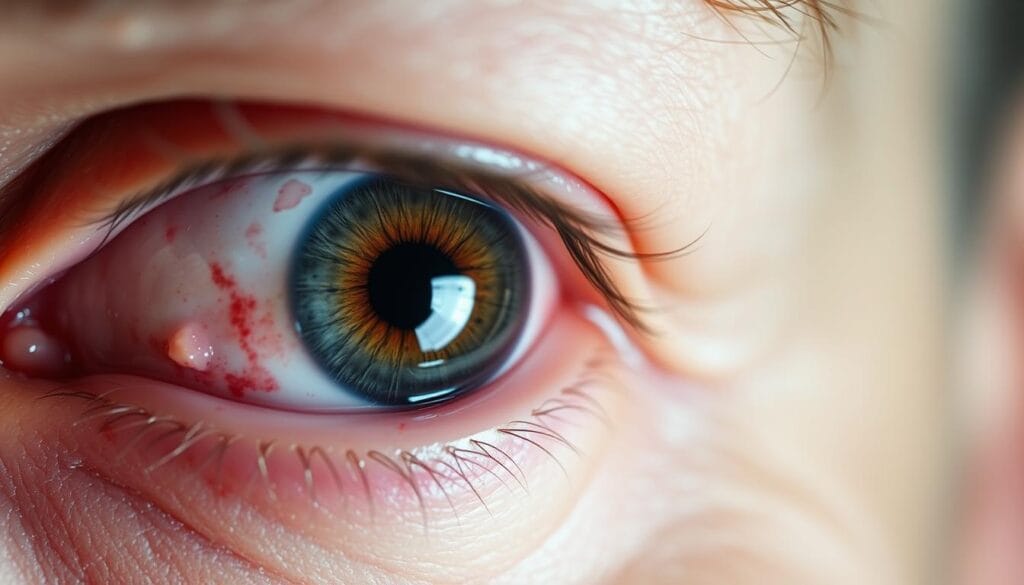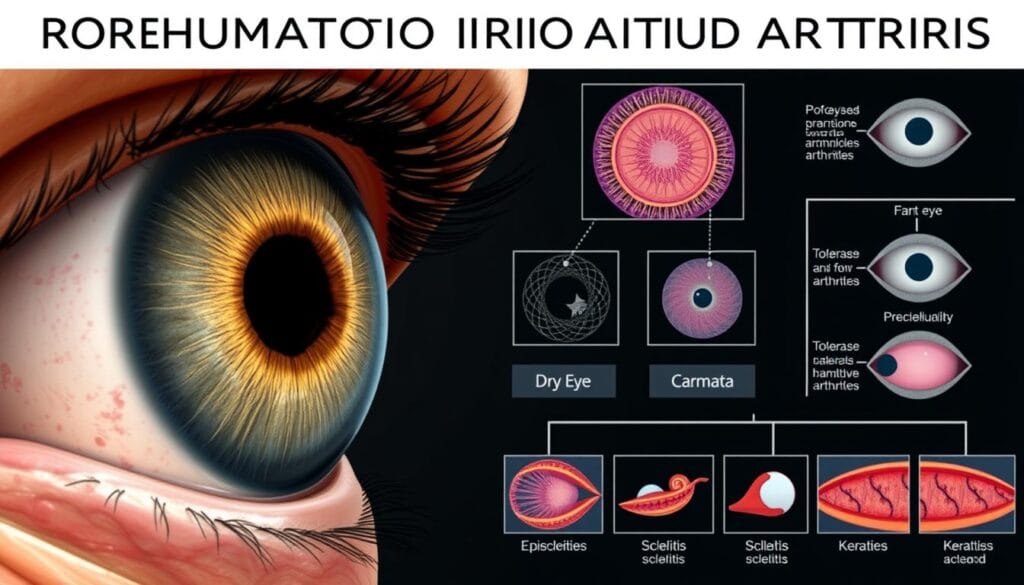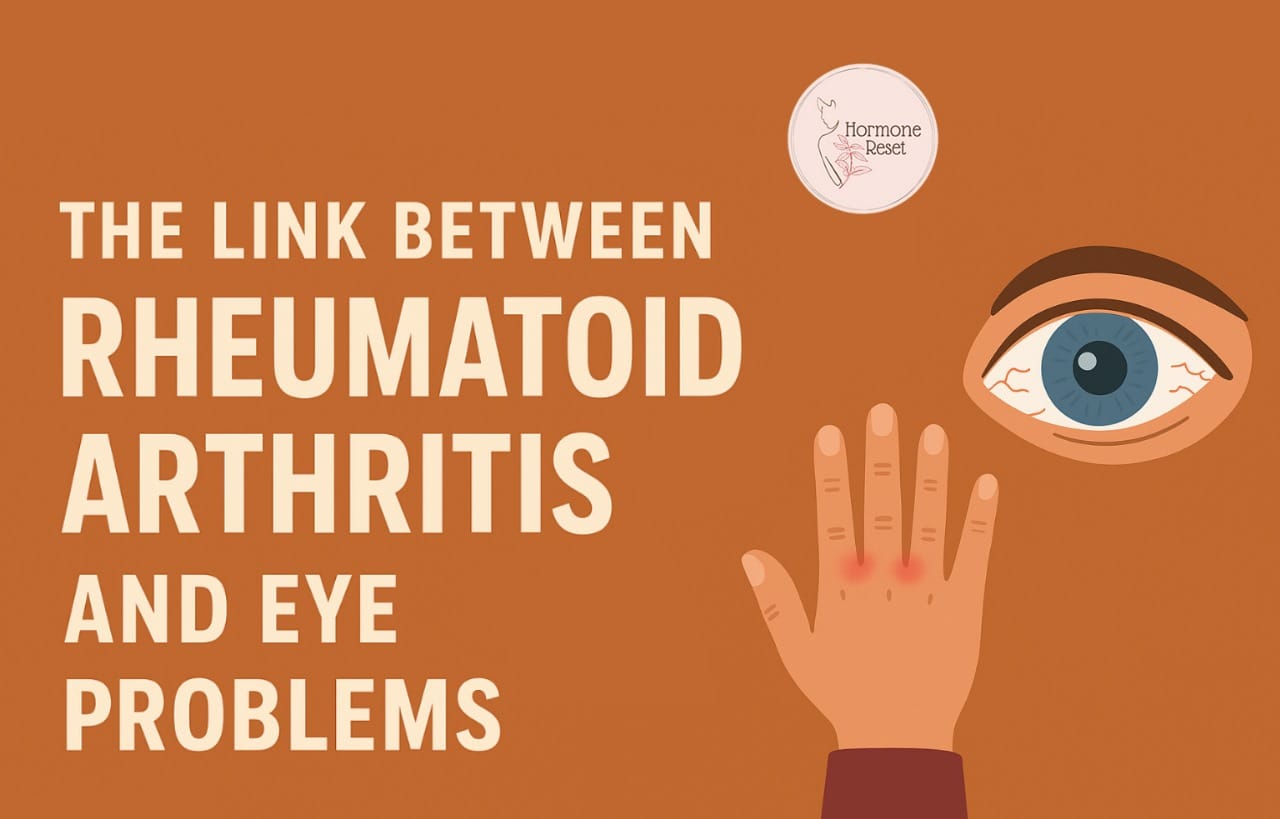If you have rheumatoid arthritis, you might know about its joint effects. But you might not know about its eye impact. Studies show people with rheumatoid arthritis face a higher risk of eye problems. This includes uveitis and scleritis.

It’s important to understand how rheumatoid arthritis affects your eyes. Knowing this can help you manage your overall health better. By being informed about eye effects, you can protect your vision.
Key Takeaways:
- Rheumatoid arthritis can increase the risk of eye problems.
- Common eye issues associated with rheumatoid arthritis include uveitis and scleritis.
- Monitoring your eye health is essential if you have rheumatoid arthritis.
- Early detection and treatment can help prevent serious eye damage.
- Maintaining overall health can contribute to better eye health.
Understanding Rheumatoid Arthritis as a Systemic Disease
Rheumatoid arthritis (RA) is more than just joint pain. It affects many parts of your health. Knowing this is key to managing it.
The Autoimmune Nature of Rheumatoid Arthritis
RA is caused by an autoimmune response. Your immune system attacks the lining of your joints. This leads to inflammation and damage. It can harm other parts of your body too.
How Inflammation Extends Beyond Your Joints
Inflammation from RA doesn’t just stop at your joints. It can reach other areas, like your eyes. Knowing this is important for your care.
The Inflammatory Cascade Effect
The inflammation in RA starts a chain reaction. This cascade effect can harm different organs. It shows why RA is a systemic disease, affecting more than just your joints.
Extra-articular Manifestations of RA
RA can affect other parts of your body, not just your joints. This includes eye problems and more. Spotting these signs is crucial for managing RA well.
Seeing RA as a systemic disease helps you understand the need for full care. It’s not just about your joints. It’s about your overall health.
Can Rheumatoid Arthritis Damage Your Eyes? The Critical Connection
If you have rheumatoid arthritis, you might face eye problems. This is because the disease causes inflammation that can spread to other parts of your body. It’s not just your joints that can be affected.
The Inflammatory Pathway from Joints to Eyes
The inflammation from RA can reach your eyes. This happens because the same inflammation that harms your joints can also damage your eyes. Your eyes have delicate structures that can be affected.
Prevalence of Eye Complications in RA Patients
Research shows that RA patients are more likely to have eye problems. The exact number varies, but it’s clear that RA patients face a higher risk.
Recent Research Findings
Recent studies have found a strong link between RA and eye conditions. For example, almost 40% of RA patients have experienced eye complications.
Risk Factors That Increase Your Chances
Some factors can make you more likely to have eye problems if you have RA. These include how severe your RA is, how long you’ve had it, and your age.
| Risk Factor | Description | Impact on Eye Health |
| Severity of RA | More severe RA is associated with higher levels of inflammation. | Increased risk of eye complications. |
| Duration of RA | Longer duration of RA can lead to more significant damage over time. | Higher likelihood of developing eye issues. |
| Age | Older adults are more prone to complications due to decreased resilience. | Increased vulnerability to eye problems. |
Knowing about these risk factors and how RA affects your eyes can help you protect your vision. It’s important to regularly check your eyes and work closely with your healthcare team.
The Spectrum of Eye Conditions Linked to Rheumatoid Arthritis
If you have rheumatoid arthritis, knowing about eye problems is important. This disease can affect more than just your joints. It can also harm your eyes, leading to vision loss and other issues.

- Dry Eye Syndrome: The Most Common Manifestation
- Dry Eye Syndrome is a common eye problem for people with rheumatoid arthritis. It happens when your eyes don’t make enough tears or when the tears are not good. This causes dryness, irritation, and discomfort in your eyes.
- Symptoms and Impact on Daily Life
- Symptoms of Dry Eye Syndrome can be mild or severe. They include dryness, grittiness, burning, and blurred vision. These symptoms can make everyday tasks hard, like reading or using digital devices.
- Connection to Sjögren’s Syndrome
- For RA patients, Dry Eye Syndrome might also be linked to Sjögren’s Syndrome. This is an autoimmune disease that affects glands, especially the salivary and lacrimal glands. This connection shows why RA patients need comprehensive care.
Scleritis and Episcleritis: When the Eye’s Outer Layer Inflames
Scleritis and episcleritis are conditions that affect the outer layer of the eye. Scleritis is more serious and can lead to vision loss if not treated. Episcleritis is less severe but still needs attention to avoid discomfort.
Scleritis can cause eye pain, redness, and sensitivity to light. It’s linked to rheumatoid arthritis. Episcleritis also causes eye pain and redness but is generally less severe.
Uveitis: The Silent Threat to Your Vision
Uveitis is inflammation in the middle layer of the eye. It can cause vision problems, eye pain, and light sensitivity. This condition is serious because it can lead to vision loss if not treated quickly.
Uveitis is linked to rheumatoid arthritis. Regular eye exams are important to catch it early, as it can be silent until it’s severe.
Retinal Vasculitis: The Most Severe Complication
Retinal vasculitis is a rare but serious condition. It involves inflammation of the blood vessels in the retina. It can cause vision loss and is associated with rheumatoid arthritis. Quick diagnosis and treatment are key to prevent permanent damage.
Knowing about eye conditions linked to rheumatoid arthritis helps you manage your eye health. Regular check-ups and working with your healthcare team are crucial to keep your vision safe.
Warning Signs: Recognizing Eye Problems Before They Worsen
If you have rheumatoid arthritis, watching out for eye problems is key. These issues can get serious if not caught early. Knowing the signs is important for quick treatment.
Early Symptoms You Should Never Ignore
Some early signs of eye problems from rheumatoid arthritis include:
- Redness and pain in the eyes, which can be a sign of inflammation.
- Blurred vision or changes in your vision, indicating potential issues within the eye.
- Dryness or grittiness, often associated with dry eye syndrome.
- Sensitivity to light, which can be uncomfortable and affect daily activities.
Distinguishing Between Normal Eye Fatigue and RA-Related Issues
Telling normal eye fatigue from RA-related symptoms can be tough. But, if eye discomfort lasts or gets worse, see your doctor. They can figure out if it’s RA or something else.
When to Seek Emergency Care for Your Eyes
Some eye problems need quick medical help. Look for emergency care if you have:
- Sudden loss of vision or severe vision changes.
- Severe eye pain that doesn’t improve with over-the-counter pain relievers.
- Eye redness accompanied by vision changes or discharge.
Looking after your eye health is vital when you have rheumatoid arthritis. Spotting warning signs and getting medical help when needed can protect your vision and health.
The Collaborative Care Approach: Your Medical Team
Managing rheumatoid arthritis (RA) and eye problems requires a team effort. This approach brings together many healthcare experts. They work together to tackle RA’s joint and eye-related issues.
The Essential Role of Your Rheumatologist
Your rheumatologist is key in managing RA. They focus on arthritis and related diseases. They keep RA inflammation under control, which helps prevent eye problems.
When and Why to See an Ophthalmologist
An ophthalmologist specializes in eye disorders. If you have eye symptoms or concerns, see one. They can handle RA-related eye issues like dry eye and uveitis.
Coordinating Care Between Specialists
It’s important for your rheumatologist and ophthalmologist to work together. Good communication helps avoid complications and improves treatment plans.
Communication Strategies That Work
To improve communication, use a shared medical record or patient portal. Regular meetings between your doctors can also adjust your care as needed.
Questions to Ask Each Provider
- What are the potential eye-related side effects of my RA medications?
- How often should I have my eyes checked?
- Are there any specific eye symptoms I should be aware of?
By working with your medical team and staying informed, you can protect your vision and health.
Empowering Yourself: Proactive Steps to Protect Your Vision
If you have rheumatoid arthritis, you can protect your eyes. This is by watching your eyes, eating right, and changing your lifestyle. These steps can lower the chance of eye problems linked to rheumatoid arthritis.
Creating Your Eye Health Monitoring Schedule
Getting regular eye exams is key. See your eye doctor once a year. Tell them if your vision or eye feels different.
Nutrition Strategies That Support Eye Health
Eating foods that fight inflammation is good for your eyes. Omega-3 fatty acids in fish and nuts are especially good.
Anti-inflammatory Foods to Embrace
- Fatty fish like salmon
- Nuts and seeds
- Leafy greens
Supplements with Evidence-Based Benefits
Think about taking omega-3 fatty acids and vitamin D. But talk to your doctor first:
| Nutrient | Benefit | Food Sources |
| Omega-3 fatty acids | Reduces inflammation | Salmon, walnuts |
| Vitamin D | Immune system regulation | Fortified dairy, sunlight exposure |
Lifestyle Modifications That Make a Difference
Simple changes can help your eyes. Quit smoking and keep a healthy weight.
Digital Eye Strain: Special Considerations for RA Patients
Use the 20-20-20 rule. Every 20 minutes, look away from screens and focus on something 20 feet away for 20 seconds.
Conclusion: Your Vision Matters – Taking Control of Your Eye Health with RA
Rheumatoid arthritis can really affect your eye health, and knowing this is key. It’s not just about if RA can harm your eyes. It’s about taking steps to keep your vision safe.
Managing rheumatoid arthritis means taking care of your whole health, including your eyes. Knowing the eye problems RA can cause helps you work with your doctors. This way, you can catch and fix any eye issues early.
Your fight with rheumatoid arthritis is special, and so are your eye care needs. By staying informed and taking action, you can lower the chance of eye damage. Take charge of your eye health today. Aim for a future where RA doesn’t control your sight.
FAQ’s
- Can rheumatoid arthritis damage your eyes?
- Yes, rheumatoid arthritis can harm your eyes. It can cause dry eye, scleritis, episcleritis, uveitis, and retinal vasculitis. These problems are due to the disease’s inflammatory nature.
- What are the common eye conditions associated with rheumatoid arthritis?
- Rheumatoid arthritis can lead to several eye problems. These include dry eye, scleritis, episcleritis, uveitis, and retinal vasculitis. If not treated, these can cause vision issues.
- How does rheumatoid arthritis cause eye inflammation?
- Rheumatoid arthritis causes eye inflammation in the same way it affects joints. This leads to conditions like scleritis, episcleritis, and uveitis.
- What are the symptoms of rheumatoid arthritis-related eye problems?
- Symptoms can include eye pain, redness, and dryness. You might also see blurred vision, sensitivity to light, and floaters. The symptoms vary based on the eye condition.
- How can I protect my vision if I have rheumatoid arthritis?
- To protect your vision, get regular eye exams. Manage your rheumatoid arthritis with your doctor. Adopt healthy habits and watch for early signs of eye problems.
- When should I seek emergency care for rheumatoid arthritis-related eye issues?
- Seek emergency care for sudden vision loss, severe eye pain, or increased sensitivity to light. These are signs of serious eye conditions that need immediate attention.
- How often should I have my eyes checked if I have rheumatoid arthritis?
- Regular eye exams are key. The frequency depends on your rheumatoid arthritis severity and eye conditions. Talk to your ophthalmologist for a personalized schedule.
Please subscribe to our social channels for updates related to functional medicines.
Instagram: thehormonereset
Facebook: Hormone Reset
YouTube: Hormone Reset Program
LinkedIn: Hormone Reset





Leave a Reply